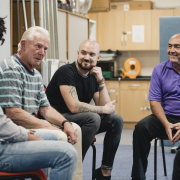Men’s mental health matters: starting meaningful conversations
If you’re male and buy into the myth that you are immune from the challenges that life will throw at you and that you won’t experience a serious mental health condition in your lifetime, think again!
According to the Australian Bureau of Statistics’ National Survey of Mental Health and Wellbeing, one in seven Australian men experience depression or anxiety or both in any year.[i]
Stereotypes have also led to a culture where men feel they have to keep a stiff upper lip, their feelings shrouded in fear of appearing weak.
This is a dangerous misconception and no doubt a factor in the suicide rate for males increasing between 2011 and 2020, where it now stands at 18.6 deaths per 100,000.[ii]
Women don’t face the same stigma as men, with the same research finding that three quarters of people who died by suicide were male.
What’s the issue?
Men simply don’t appear to seek professional help when they need it. While there’s plenty of mental health support for men and their unique challenges, a lot of men simply don’t take it up. The National Survey of Mental Health and Wellbeing – designed to provide lifetime prevalence estimates for mental disorders – shows that men in Australia are less likely to access services for mental health problems compared to women.[iii]
Since Covid-19, many services have become digital, but the trend is still the same. Women are more than twice as likely as men to have used a digital service to access mental health support.[iv]
Until the stereotypes around men’s mental health changes, men need to take advantage of informal networks of support, like speaking with family and friends when they need help, and being there for their family and friends when they need them.
When should you have a chat about your own mental health?
When’s the right time to talk about something that you’re struggling with? This question lacks a single answer because there’s no-one-size-fits-all solution.
It’s important to remember that, whenever you decide to have a chat about mental health, you should feel safe, comfortable and ready to give your full attention.
You might find it easier to talk at the local pub if that’s where you meet your friends, but this might be noisy and full of people, making it less likely you’ll be engaged.
Sometimes, chatting at work might be an option, but it can be too easy to be distracted and you might be pushed for time, hampering your chances of a proper chat.
That’s why it’s up to you to find a time and space that suits you. Try a walk in the park, or have a friend around to your home where it’s quieter.
How can you start the conversation around your own mental health?
Just thinking about starting the conversation about mental health can be daunting, especially for men, who already face a host of negative and generational stigmas around opening up.
Before you even start the conversation, you need to think about who you’re going to talk to, be it a friend or family member.
It’s important to choose someone who you know will be supportive. We all have that one friend who is self-obsessed, so give them a miss in this instance.
Once you’re with someone you trust, try to be completely open with them and avoid tip-toeing around the subject and how you’re feeling.
Say what’s on your mind, for example, “I’ve been really nervous to speak about this, but I’m struggling with depression and I don’t want to do this on my own. Could you help me get support?”
Even though it might sound daunting at first, once it’s off your chest, you’ll feel like a weight has been lifted, and you’ll feel more comfortable discussing the subject further.
Remember, there’s no harm practising what you’re going to say beforehand, just don’t let your mind dwell on it too much otherwise you might come up with an excuse to put off a conversation you really need.
What responses can you expect from your friends?
The response you get largely depends on the person you’re speaking to, but it’s extremely unlikely you’ll be met with a negative response.
The person you’re speaking with will be empathetic and show a willingness to support you anyway they can, and anyway you wish.
It’s worth keeping in mind that the person will want to help you and even try to come up with solutions there and then. If they do, remember that it’s a natural reaction and that it’s coming from a good place. Even though you’re not looking for them to solve your problem, treat their willingness as a sign of love and respect.
The reality is they are not a trained professional and, despite their obvious concern and care for your wellbeing, you may have to tell them that you just need them to listen and to be there for you.
This is where speaking to a professional, like a psychologist, can help. They’re specially trained to support you, and they’re also OK with just listening.
What else can I do to support my own mental health?
Seeking support from a professional is always advised, but there are a number of other things you can do to boost your own mental health.
MensLine Australia has provided a list of handy tips to promote mental wellbeing, many of which should be simple to implement, but provide vital support.
Develop and maintain strong relationships
Developing and maintaining strong relationships with your partner, children, friends and family members is a vital aspect of looking after your mental health.
Humans are social animals, so staying connected isn’t just important because you care for the people around you, but because it benefits your mental health.
Even though it can require time and care to develop and maintain strong relationships, it’s worth it. Keep this in mind the next time a friend asks to meet up.
Broaden your interests
Do the things you enjoy doing, and broaden your interests wherever possible. Not only will you find more things you enjoy doing, but you’ll also build your support network.
This is especially important for men, whose identity is often linked to work and contributing towards the family and household – the old, outdated stereotype of being “the breadwinner”.
Engaging in things like sports or other hobbies can give you a purpose outside of the workplace and make a huge difference to your mental health.
Take care of your physical health
Physical health problems and mental health problems tend to work in a cycle, with problems in one significantly increasing the risk of problems in another.
Research has shown that people with a mental health problem are more likely to have a preventable physical health condition, such as heart disease.[v]
Making sure you’re doing things like getting enough exercise can prevent this. Even getting the recommended minimum of 30 mins each day can make a huge difference.[vi]
Notice your signs
Staying in tune with your thoughts and feelings can help you keep tabs on the status of your mental health, acting as an early warning sign that something’s wrong.
Everyone reacts differently to mental health worries – some people notice physical signs, like trouble sleeping, others notice behavioural signs, like avoiding spending time with friends.
It’s important to know yourself and to recognise your warning signs, so that you’re aware if something starts to feel or appear wrong and to have the confidence in yourself or your support network that you can the take steps you need to stop things getting worse.
Access free online resources
There are plenty of free online resources out there that do a great job at providing mental health-related information, tips and advice for men.
Along with providing a telephone and online counselling service, MensLine Australia is packed full of resources covering a range of topics, including family and relationship concerns.
Beyond Blue has a whole section of their website dedicated to men’s mental health, including advice for new dads and a forum where men can chat about their issues.
Urgent mental health support for men
If there’s an immediate risk of harm to yourself or others, please call 000.
If you need someone to talk with now, call:
- MensLine Australia: 1300 789 978
- Beyond Blue: 1300 22 4636 or chat online at beyondblue.org.au
- Suicide Call Back Service: 1300 659 467
- Lifeline: 13 11 14
Need to talk to someone?
With 88 experienced practitioners, Access Psych has registered and provisional psychologists throughout Australia. Our team has experience in a wide range of mental health fields, including providing mental health support for men.
Alternatively, if you have any questions about Access Psych and what else we can do for you, visit our Frequently Asked Questions page.
When you’re ready, you can book an appointment online, speak to one of our friendly team on 1800 277 924 or email info@accesspsych.com.au.
The information provided in this document is general in nature and is intended to be used for information purposes only. While we have tried to ensure the accuracy of the information published, no guarantee can be given that the information is free from error or omission or that it is accurate, current or complete.
The information published is not, and should not be relied on as, health or treatment advice. The diagnosis and treatment of any mental illness requires the attention of a physician or other properly qualified mental health professional. If you are seeking diagnosis or treatment of any other mental illness, you should consult a physician or mental health professional. You should not delay in seeking, or disregard, professional health advice because of something you have read in this document.
[i] https://www.abs.gov.au/statistics/health/mental-health/national-study-mental-health-and-wellbeing/2007
[ii] https://www.abs.gov.au/statistics/health/causes-death/causes-death-australia/latest-release
[iii] https://www.abs.gov.au/statistics/health/mental-health/national-study-mental-health-and-wellbeing/2020-21
[iv] https://www.ncbi.nlm.nih.gov/pmc/articles/PMC4647287/
[v] https://www.mentalhealth.org.uk/explore-mental-health/a-z-topics/physical-health-and-mental-health
[vi] https://www.health.gov.au/health-topics/physical-activity-and-exercise/physical-activity-and-exercise-guidelines-for-all-australians





